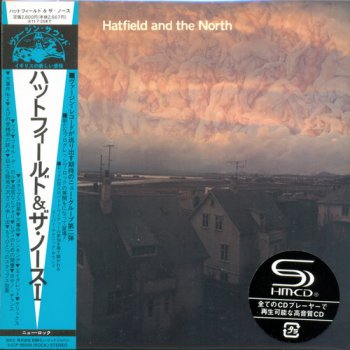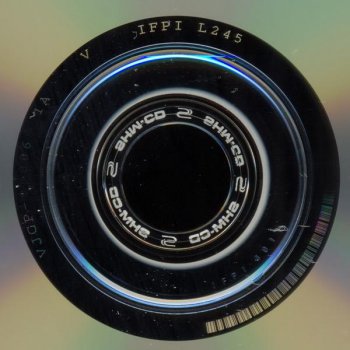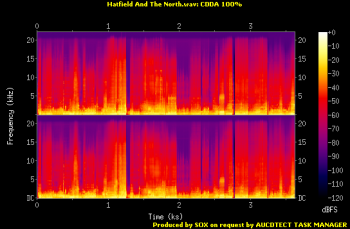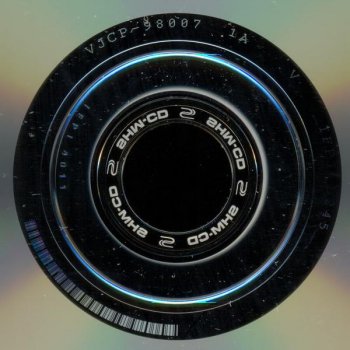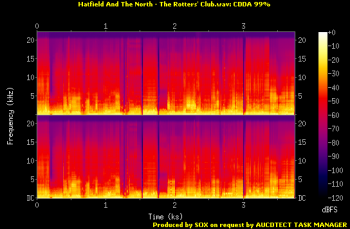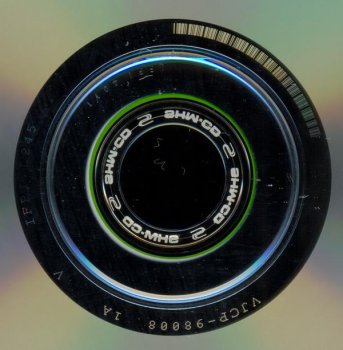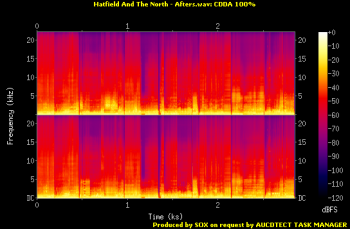Hatfield And The North: 1974 Hatfield And The North / 1975 The Rotters' Club / 1980 Afters ● EMI Music / Virgin Records Japan SHM-CD 2011
18 июня 2011. Разместил: ALLexxess
Lossless Galaxy Release

Hatfield And The North: 3 Albums
1974 Hatfield And The North / 1975 The Rotters' Club / 1980 Afters
EMI Music / Virgin Records Japan SHM-CD 2011
1974 Hatfield And The North / 1975 The Rotters' Club / 1980 Afters
EMI Music / Virgin Records Japan SHM-CD 2011
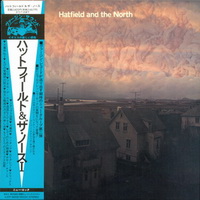
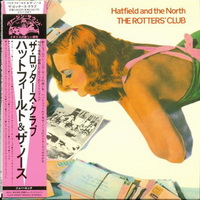
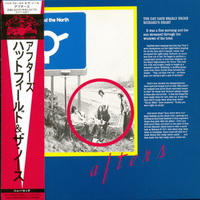
Исполнитель:
Hatfield And The North
Альбомы:
--------------------------------------------------
1974 Hatfield And The North (EMI Music / Virgin Records Japan SHM-CD 2011)
EMI Music / Virgin Japan VJCP-98006
--------------------------------------------------
1975 The Rotters' Club (EMI Music / Virgin Records Japan SHM-CD 2011)
EMI Music / Virgin Japan VJCP-98007
--------------------------------------------------
1980 Afters (EMI Music / Virgin Records Japan SHM-CD 2011)
EMI Music / Virgin Japan VJCP-98008
--------------------------------------------------
Информация:
EMI Music / Virgin Records Japan
Made in Japan
Жанр: Jazz Rock / Psychedelic Rock / Progressive Rock
Год: 2011
Формат: FLAC / Level 8 (img + *cue + log, AccurateRip)
Качество: lossless
Covers: format PNG 600dpi, full scans
Размер:
• • • • • • • • • • • • • • • • • • • • • • • • • • • • • • • •
Каждый CD можно скачать отдельно
Each CD can be downloaded separately
• • • • • • • • • • • • • • • • • • • • • • • • • • • • • • • •
Залито на: FileSonic + Hotfile + Fileserve (3% восстановление)
Cardboard sleeve (mini LP) reissue from Hatfield & The North. Part of a three-album Hatfield & The North cardboard sleeve reissue series featuring albums "Hatfield & The North," "The Rotters' Club," and "Afters." This album features the high-fidelity SHM-CD format (compatible with standard CD players) and the 2009 digital remastering. Includes bonus tracks.
Hatfield And The North
Альбомы:
--------------------------------------------------
1974 Hatfield And The North (EMI Music / Virgin Records Japan SHM-CD 2011)
EMI Music / Virgin Japan VJCP-98006
--------------------------------------------------
1975 The Rotters' Club (EMI Music / Virgin Records Japan SHM-CD 2011)
EMI Music / Virgin Japan VJCP-98007
--------------------------------------------------
1980 Afters (EMI Music / Virgin Records Japan SHM-CD 2011)
EMI Music / Virgin Japan VJCP-98008
--------------------------------------------------
Информация:
EMI Music / Virgin Records Japan
Made in Japan
Жанр: Jazz Rock / Psychedelic Rock / Progressive Rock
Год: 2011
Формат: FLAC / Level 8 (img + *cue + log, AccurateRip)
Качество: lossless
Covers: format PNG 600dpi, full scans
Размер:
• • • • • • • • • • • • • • • • • • • • • • • • • • • • • • • •
Каждый CD можно скачать отдельно
Each CD can be downloaded separately
• • • • • • • • • • • • • • • • • • • • • • • • • • • • • • • •
Залито на: FileSonic + Hotfile + Fileserve (3% восстановление)
Cardboard sleeve (mini LP) reissue from Hatfield & The North. Part of a three-album Hatfield & The North cardboard sleeve reissue series featuring albums "Hatfield & The North," "The Rotters' Club," and "Afters." This album features the high-fidelity SHM-CD format (compatible with standard CD players) and the 2009 digital remastering. Includes bonus tracks.

darkside.ru / Рецензия от Filareth
Hatfield And The North - кентерберийская супергруппа, выпустившая два великолепных альбома в середине 70-х, обозначивших своего рода кульминацию британской прогрессивной музыки, вобрав в себя все самое лучшее, что было в арт-роке тех времен: и мелодичность, и виртуозность, и экспериментальность, и сложность музыкального языка, и глубину композиторских идей. Дебютный одноименный альбом этой группы, записанный в 1973-м году, наряду с третьим альбомом Soft Machine и альбом "You" Gong является одной из сильнейших работ за всю историю существования кентерберийской тусовки. Несмотря на то, что этот коллектив принято относить к так называемой Canterbury Scene (хотя само это понятие мало, о чем говорит: слишком уж разные коллективы ютились под этой крышей - от изобретательных мелодистов Caravan до никем непонятых постмодернистов National Health), можно охарактеризовать их стиль как экспериментальный арт-рок. Это, наверное, наиболее точный термин, описывающий музыку подобного рода. Ибо с одной стороны, Хэтфилды при всей своей бескомпромиссности и очевидной авангардности никогда с головой не уходили во фри-джазовые области и не баловались радикализмом, но в то же время они слишком отличались от Genesis, Yes и даже King Crimson более смелыми идеями, новаторством, и нон-конформизмом, не перестающим, однако, в открытую конфронтацию или протест, как это было у Henry Cow и Art Bears. В отличие от тех же National Health, сознательно занявших артистически нейтральную нишу где-то между арт-модерном Khan и радикализмом Art Bears, Хэтфилды высказались до конца, будто "наболело". И в Egg, и в Caravan, и в Khan при всем их новаторстве и недюжинных потенциалах всегда чего-то не хватало, или же, наоборот, было в переизбытке, что мешало довести начатые идеи до конца. Caravan, при всем моем уважении к ним, остановились в развитии после 1972-го года; Egg были слишком неровными, да и ритм-секция была не шибко изобретательной; Khan канул в лету в связи с уходом Хилледжа в Gong; а сам Gong был слишком нестабильным, и его откровенно анархистская атмосфера, замешанная на торче и дури, мало способствовала сосредоточенной и направленной деятельности. Delivery же откровенно не хватало какой-то зажигающей идеи, чтобы превратить их из весьма заурядного джаз-рокового коллектива кентерберийсого толка во что-то более харизматичное и прогрессивное. Синклер, Стюарт, Пайл, Миллер - четыре наиболее созидательных (или креативных, если угодно), последовательных и продуктивных музыканта кентерберийской сцены, технически безупречных и одаренных в плане сочинительства, обрели-таки полную свободу самовыражения в новой группе. Здесь было все: и демократия, и дисциплина, и взаимопонимание. Структура дебюта выдержана в самых лучших традициях ранних Caravan и Soft Machine, когда альбом звучит монолитно, с композициями, плавно перетекающими одна в другую, с непрерывным потоком тем и различных зарисовок. Так были выстроены вторые по счету альбомы Caravan и Soft Machine. Диск открывается "зацикленным" синтезаторным пассажем Дэвида Стюарта, чтобы перейти в размеренную притчу Синклера с запоминающейся вокальной мелодией и небольшой вокальной же клоунадой а ля Gong, на фоне серьезной и несколько академичной музыки звучащей несколько абсурдно (впрочем, так и было задумано). После вокальных упражнений Синклера и примечательной импровизации Миллера под названием "Going up to people and tinkling" за дело берется приглашенный Роберт Уайетт со своим джазовым бессловесным вокализом в "Calyx". Далее следует сюита "Son of "there's no place like Homerton" - пожалуй, именно так должны были звучать Soft Machine после ухода Элтона Дина. Здесь можно встретить все фирменные фишки машинистов: обрывки мелодий, сведенные в петлю, синкопированные саксофоны, гипнотичность и медитативность. Хэтфилды, однако, пошли еще дальше, добавив в свою музыку нежные атмосферные вокализы Барбары Гэскин, пришедшей из недавно развалившейся Spirogyra. Развеселая "Aigrette" с оптимистичным вокальным рефреном могла быть записана и Aphrodite's Child. В "Rifferama" впечатляет деликатная работа Фила Миллера, в то время как ударные Пипа Пайла постоянно переходят какую-то сверхтонкую грань между джаз-роком и джазом. "Fol de rol" - своеобразная колыбельная с великолепным гипнотичным вокалом Синклера и, кажется, Гэскин, бесподобной бас-гитарой и бряканием на гитаре а-ля Пай Хастингс. После того, как вокал затихает, а Синлер продолжает бульканье на басу, раздается телефонный звонок, и из трубки слышится та же самая вокальная мелодия. Оригинальный ход, а сама мелодия - из разряда "Бальзам на душу". Сочиненные Синклером "Bossa nochance/Big jobs No 2" - совершенно ожиданно напоминают ранний Caravan, а "Lobster in cleavage probe" - еще одна вещь из категории, как должны были бы звучать Soft Machine, если бы не. В то же время "Gigantic land-crabs in Earth takeover bid" абсолютно точно предвосхищает звучание будущих National Health; именно так будут звучать все их альбомы: с монотонной ритмичной электронной подладкой и атональной гитарно-клавишной импровизацией, переходящей в абстрактный джаз. Палитра звучаний Стюарта здесь необычайно богата, и по большей части здесь даже не импровизации, а выверенные и очень сложные мелодические линии. Завершающая альбом "The other stubbs effect" - тот же синтезаторный пассаж, что и в начале альбома, но пущенный в обратном порядке - последний необходимый штрих, делающий работу цельной и законченной. На переиздании альбома на CD в качестве бонусов добавлены еще две композиции, выпущенные в свое время синглами и доступные также на сборнике "Afters". Озорная и задорная песня "Let's Eat (Real Soon)" напоминает очень ранний Караван, в то время как Стюарт здесь звучит, как двойник Дэвида Синклера, а Миллер, что-то бренчащий в духе Пая Хастингса, почти незаметен. Зато "Fitter Stoke Has a Bath" (оцените название!) - это уже совершенно двинутая попса, написанная в состоянии тихого помешательства, с кучей мелодических и ритмических сдвигов. Начисто срывающая шифер вещица! Неожиданная концовка этой шикарной композиции показывает, как в скором времени будет звучать весь Camel. Несмотря на то, что все четверо участников группы - виртуозные музыканты, диск начисто лишен атмосферы самодавлеющего профессионализма: все звучат искренне и совершенно непретенциозно. Этот альбом - продукт исключительно коллективного творчества, а сама группа - сплоченный коллектив неамбициозных и сугубо творческих личностей, не испорченных славой и головокружительным успехом. Ричард Синклер - без преувеличений, это гениальный басист, стоящий в одном ряду с великим Жако Пасториусом (к сожалению, уже давно покойным). Сквайр, Уэттон, Глэскок - при всех своих очевидных достоинствах объективно хуже. Синклер, в отличие, скажем, от Джеффа Берлина, никогда не обращался с басом, как с неполноценной лид-гитарой; его игра всегда очень пластична и выразительна, с множеством оттенков и богатой динамической палитрой. Послушайте его исполнение на неожиданно тяжелой "Oh, Len's Nature" из диска "Afters", где его рокочущий бас одновременно ведет и основную мелодию, и создает контрапункт, и сглаживает "углы" ритмической основы. Фил Миллер - один из очень немногих кентерберийских гитаристов, но где вы еще найдете такого виртуозного гитариста, деликатно играющего где-то в глубине микса, и "выползающего" для незабвенного эмоционального соло при необходимости? К слову сказать, Миллер еще покажет себя в National Health (в то время, как Пайл и Стюарт в National Health уже ничего нового не добавят к своей игре). Пип Пайл - первый ударник, ПОЛНОСТЬЮ размывший обозначенную Дэвисом грань между джазом и джаз-роком. Это уже, скорее, пост-джаз-рок. О его виртуозности и изобретательности сказано не единожды. Дэвид Стюарт - очень искусный клавишник, стилистичеки очень мобильный, органично сочетающий в своей игре элементы джаза, арт-рока, авангарда и еще черт-те-знает-чего. Лучшие его работы, на мой взгляд, приходятся на первый альбом Egg, единственный альбом Khan и на альбомы Hatfield And The North. Дебют Hatfield And The North - образец изысканности, утонченности и высокого вкуса.
Allmusic.com / Biography by Jason Ankeny
Emerging from the Canterbury, England musical community which also launched Gong and Kevin Ayers' the Whole World, the whimsical progressive rock unit Hatfield and the North formed in 1972. Named in honor of a motorway sign outside of London, the group's founding membership brought together a who's-who of the Canterbury art-rock scene - vocalist/bassist Richard Sinclair was a former member of Caravan, guitarist Phil Miller had tenured with Robert Wyatt in Matching Mole, and drummer Pip Pyle had served with both Gong and Delivery. After a series of line-up shuffles, keyboardist Dave Stewart (an alumnus of Egg) was brought in to complete the roster, and in tandem with the Northettes - a trio of backing vocalists consisting of Barbara Gaskin, Amanda Parsons and Ann Rosenthal - the group began gigging regularly. Upon signing to Virgin, Hatfield and the North recorded their 1974 self-titled debut LP, a jazzy, largely improvisational work halfway between melodic pop and more avant-garde stylings. A single, "Let's Eat (Real Soon)," appeared at the end of the year, and in 1975 the group resurfaced with The Rotters Club; although the record briefly landed in the U.K. charts, their commercial future looked dim, and so Hatfield and the North disbanded within months of the album's release. Sinclair soon joined Camel, while Stewart recorded with Bill Bruford before finding pop success in 1981 with ex-Zombie Colin Blunstone on a cover of the Jimmy Ruffin chestnut "What Becomes of the Broken Hearted?" In 1989, Hatfield and the North reunited, minus Stewart, for a series of live dates; a document of the performances, Live 1990, followed in 1993.
Allmusic.com / Review by Nick Burton
Hatfield and the North were the supergroup of England's Canterbury progressive rock scene, with bassist and vocalist Richard Sinclair from Caravan, guitarist Phil Miller from Matching Mole, keyboardist Dave Stewart from Egg, and drummer Pip Pyle from Gong and Delivery. This brilliant and inventive debut album is a cross between sophisticated, precisely executed jazz-rock and dry-humored, often surreal pop. The album consists of short pieces blended into a Zappa-like collage, providing a thematic work that bests even the most eccentric jazz-rock by bands like Soft Machine.
247MB (2 Part) + 236MB (1 Part)
01 The Stubbs Effect
02 Big Jobs (Poo Poo Extract)
03 Going Up To People And Tinkling
04 Calyx
Vocals - Robert Wyatt
05 Son Of 'There's No Place Like Homerton'
06 Aigrette
07 Rifferama
08 Fol De Rol
09 Shaving Is Boring
10 Licks For The Ladies
11 Bossa Nochance
12 Big Jobs No. 2 (by Poo And The Wee Wees)
13 Lobster In Cleavage Probe
14 Gigantic Land Crabs In Earth Takeover Bid
15 The Other Stubbs Effect
Bonus Tracks
16 Let's Eat (Real Soon)
17 Fitter Stoke Has A Bath
18 Your Majesty Is Like A Cream Donut Incorporating Oh What A Lonely Lifetime
EAC log - AccurateRip
audiochecker / auCDtect
Spectrum / Matrix
01 The Stubbs Effect
02 Big Jobs (Poo Poo Extract)
03 Going Up To People And Tinkling
04 Calyx
Vocals - Robert Wyatt
05 Son Of 'There's No Place Like Homerton'
06 Aigrette
07 Rifferama
08 Fol De Rol
09 Shaving Is Boring
10 Licks For The Ladies
11 Bossa Nochance
12 Big Jobs No. 2 (by Poo And The Wee Wees)
13 Lobster In Cleavage Probe
14 Gigantic Land Crabs In Earth Takeover Bid
15 The Other Stubbs Effect
Bonus Tracks
16 Let's Eat (Real Soon)
17 Fitter Stoke Has A Bath
18 Your Majesty Is Like A Cream Donut Incorporating Oh What A Lonely Lifetime
EAC log - AccurateRip
audiochecker / auCDtect
Spectrum / Matrix
Внимание! У Вас нет прав для просмотра скрытого текста.
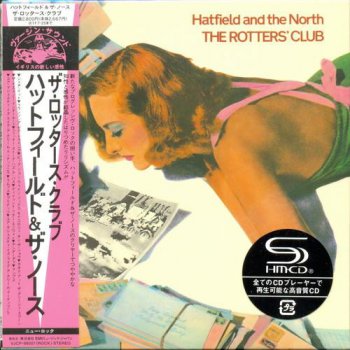
1975 The Rotters' Club
Original release: Virgin V 2030
Recorded and mixed on Saturn, Worthing Recording Studio, January and February, 1975
Allmusic.com / Review by Dave Lynch
Hatfield and the North's second LP stands as a high watermark for the prog rock associated with England's Canterbury scene and, while filled with stunning musicianship, demonstrates both the strengths and some of the weaknesses of the Hatfield style. Dave Stewart on keyboards, Phil Miller on guitar, Richard Sinclair on bass and vocals, and Pip Pyle on drums (supplemented by a few guest instrumentalists and the ever-ethereal Northettes with their "la la" backing vocals) generally show an admirable sense of restraint and, like their Canterbury peers, are careful to avoid the pomposity and bombast of better-known prog rockers of the era, such as Emerson, Lake & Palmer and Yes. But the Hatfields might actually have been light to a fault, particularly whenever a segue from one of their convoluted instrumental passages into a Richard Sinclair vocal vehicle occurred. Sinclair shares a bit of Robert Wyatt's singing approach, or at least Wyatt's more whimsical side, but his polite and mellow croon, while pleasant, is less idiosyncratic and ultimately rather bland. And, don' t look for much importance from the songs' nearly empty lyrical content; perhaps this was another conscious attempt to steer clear of the pretentiousness of the typically overbearing prog rock song style, but the words leave precious little to sink the listener's teeth into. Things actually get off to a relatively strong start with "Share It," a catchy little number with Sinclair expressing some idealistic and hard-to-criticize Brit hippie sentiments. At the several other places where vocals crop up, however, it's all a bit empty-headed and self-referential. Thankfully, these songs are few and far between, but they're still rather hard to avoid; the Hatfields were masters of the segue and the most masterly demonstrations of instrumental technique wind up bleeding into some pretty dumb stuff from Sinclair's pipes. (In fairness, he isn't credited with writing all the words he wound up singing.) Nevertheless, Stewart, Miller, and Pyle all make some wonderful statements, as does Sinclair on bass for that matter. Particularly noteworthy are Miller's two short jazzy instrumentals, "Lounging There Trying" and "Underdub," which, with their sparkling electric piano work from Stewart, have a light and airy improvisational feel despite rather thorough scoring; Pyle's propulsive "Yes No Interlude" with its furious melding of Stewart's keyboards and the sax of guest Jimmy Hastings; and Stewart's 20-minute opus "Mumps." The latter is particularly impressive, with everything anyone would want from an extended-form Canterbury-style workout. The piece ebbs and flows through nimbly executed thematic passages and variations, featuring one of Stewart's most compelling themes and also one of the best fuzz organ solos that he (or Mike Ratledge or David Sinclair for that matter) ever recorded. Then, smack dab in the middle of it all, here comes Sinclair with a throwaway tune using letters of the alphabet as words; it really interrupts the flow. Everything is retrieved with a dramatic instrumental coda, though, melding spacy effects, more great organ playing from Stewart, and spectacularly executed unison lines from Miller and Hastings in crescendo before the final fade. All that lightweight stuff is forgotten. The Virgin Records CD reissue features several live bonus tracks (also found on the Afters compilation), including two comparatively crazed and heavy Miller instrumental pieces recorded in France and, from a date at the Rainbow Theatre in London, Sinclair's "Halfway Between Heaven and Earth," which has a bit more of the feel of his vocal work with Caravan than with the Hatfields. Too bad there's a premature fadeout during another great Stewart organ solo. One wonders where the band was headed with that.
247MB (2 Part) + 232MB (1 Part)
01 Share It
02 Lounging There Trying
03 (Big) John Wayne Socks Psychology On The Jaw
04 Chaos At The Greasy Spoon
05 The Yes / No Interlude
06 Fitter Stoke Has A Bath
07 Didn't Matter Anyway
08 Underdub
09 Mumps
A. Your Majesty Is Like A Cream Donut (Quiet)
B. Lumps
C. Prenut
D. Your Majesty Is Like A Cream Donut (Lound)
Bonus Tracks
10 Halfway Between Heaven And Earth (Full Version)
11 Oh, Len's Nature!
12 Lying And Gracing
EAC log - AccurateRip
audiochecker / auCDtect
Spectrum / Matrix
01 Share It
02 Lounging There Trying
03 (Big) John Wayne Socks Psychology On The Jaw
04 Chaos At The Greasy Spoon
05 The Yes / No Interlude
06 Fitter Stoke Has A Bath
07 Didn't Matter Anyway
08 Underdub
09 Mumps
A. Your Majesty Is Like A Cream Donut (Quiet)
B. Lumps
C. Prenut
D. Your Majesty Is Like A Cream Donut (Lound)
Bonus Tracks
10 Halfway Between Heaven And Earth (Full Version)
11 Oh, Len's Nature!
12 Lying And Gracing
EAC log - AccurateRip
audiochecker / auCDtect
Spectrum / Matrix
Внимание! У Вас нет прав для просмотра скрытого текста.
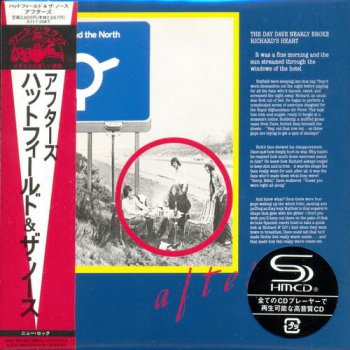
1980 Afters
Original release: Virgin VR5
Mostly compilation from "Hatfield and the North" and "The Rotters' Club", but added single from 1974, and some live recordings.
en.wikipedia.org
Afters is a 1980 compilation album (LP only) released by Canterbury scene band Hatfield and the North. Of the sixteen tracks, eleven are taken from the band's two studio albums Hatfield and the North and The Rotters' Club, three are live recordings, and the two remaining songs are those from their 1974 single "Let's Eat (Real Soon) / Fitter Stoke Has a Bath".
209MB (3 Part)
01 Let's Eat (Real Soon)
02 Fitter Stoke Has A Bath
03 Mumps (Edited)
04 Share It
05 Lounging There Trying
06 The Stubbs Effect
07 Big Jobs (Poo Poo Extract)
08 Going Up To People And Tinkling
09 Calyx
Voice - Robert Wyatt
10 (Big) John Wayne Socks Psychology On The Jaw
11 Chaos At The Greasy Spoon (Edited)
12 Halfway Between Heaven And Earth
13 Oh, Len's Nature!
14 Lything And Gracing
15 Prenut
16 Your Majesty Is Like A Cream Donut (Loud)
EAC log - AccurateRip
audiochecker / auCDtect
Spectrum / Matrix
01 Let's Eat (Real Soon)
02 Fitter Stoke Has A Bath
03 Mumps (Edited)
04 Share It
05 Lounging There Trying
06 The Stubbs Effect
07 Big Jobs (Poo Poo Extract)
08 Going Up To People And Tinkling
09 Calyx
Voice - Robert Wyatt
10 (Big) John Wayne Socks Psychology On The Jaw
11 Chaos At The Greasy Spoon (Edited)
12 Halfway Between Heaven And Earth
13 Oh, Len's Nature!
14 Lything And Gracing
15 Prenut
16 Your Majesty Is Like A Cream Donut (Loud)
EAC log - AccurateRip
audiochecker / auCDtect
Spectrum / Matrix
Внимание! У Вас нет прав для просмотра скрытого текста.
Вернуться назад
